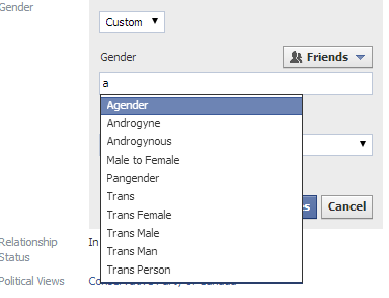
The Internet is officially abuzz about Facebook Inc.’s newly expanded gender categories. Here’s the story in brief: Facebook now allows users to select from over 50 gender identifications, such as genderqueer, cisgender, agender etc. (here is a glossary of the options). The move has drawn the expected responses from all of the usual suspects. The deep conservatives are annoyed, the liberals are elated, and the critical progressives appreciate the gesture, realize its significance, but remain dissatisfied with any form of identification confined to a box. I’m of the critical progressive camp, and happy to defer you readers to all of the smart things written by other people.
Meanwhile, I want to focus on another piece of the gender-identity expansion, a piece of great significance which has nonetheless snuck by in light of the jubilation, fighting, and intellectualism surrounding our new opportunity to bend the gender binary. Namely, I want to talk about privacy, and Facebook’s shifting discourse about identity and power.
A key defining characteristic of Facebook is the profile’s connection to a “real world” referent. Terms of Service are such that users are supposed to display their real names and maintain only a single profile. The architecture is such that other users are easy to find and connect with. The normative structure is such that requests for connection are generally abided. All of this sets the stage for quickly growing intertwining networks. Such intertwinement results in context collapse, or the blurring of network walls, as Facebook users engage with others from the multitude—sometimes contradictory—roles which make up the self.
Recognizing context collapse, and addressing the issue, Zuckerberg (in)famously said to David Kirkpatrick, author of The Facebook Effect, that:
The days of you having a different image for your work friends or co-workers and for the other people you know are probably coming to an end pretty quickly. Having two identities for yourself is an example of a lack of integrity
That is, Zuckerberg (and by extension, Facebook Inc.) ignored throngs of social psychological research about self and identity. But more than that, remained ignorant to the reality that some identities are more troublesome than others, and that those who hold troublesome identities may need to maintain network separations for reasons having little to do with integrity. Or, as Anil Dash aptly summarizes:
If you are twenty-six years old, you’ve been a golden child, you’ve been wealthy all your life, you’ve been privileged all your life, you’ve been successful your whole life, of course you don’t think anybody would ever have anything to hide
Along comes the new 50+ gender option. My favorite feature of this option is its privacy settings. Unlike a life event, changes in gender are not displayed via the News Feed. Moreover, and more importantly, users can select which members of their network are privy to their newly customized identification.
Implicitly, then, through an architectural alteration to the Facebook platform, Zuckerberg acknowledges that some identities are in fact marginalizing. That separation can be an issue of safety, rather than integrity. That collapsed contexts, though not without benefit, hold differential consequences for different kinds of people. It’s an acknowledgment that power matters, and that those without it have less freedom in both interaction and identification.
The expansion of gender categories is a step, if imperfect, in the right direction. It pushes and rearranges, but never radically breaks. The privacy sensitivity surrounding the new gender options, though, is a pretty big deal.
Follow Jenny on Twitter @Jenny_l_Davis

Comments 7
drcab1e — February 17, 2014
Great post, and thanks for taking it a bit beyond the uncritical "yay Facebook solved trans expression overnight" reaction seen elsewhere.
While the steps they've made towards privacy are a nod in the direction of vulnerable and partially-closeted trans people, they've tied pronoun choices(which are protectable) to the gender you select(which is confusingly a separate protection).
So when one person selected "them", they ended up switching their gender to son/brother for all their family to see(despite having set up privacy so that family don't see the pronoun change).[1]
The defaulting to male honorifics raises other, more traditionally feminist questions, and to my mind continues to betray the problems of sexism in tech.
While I applaud this step, I think that applauding them on having implemented the privacy well is highly questionable and I believe that this policy has been pushed through by a single(or small group) of highly privileged(to my knowledge binary) trans engineers within facebook[2], with minimal consultation or engagement with the broader trans community.
This isn't a brave new step, in terms of privacy, multiple identity expression, or sympathetic design- It's the same old facebook, developing features that work well for a privileged minority, and ignoring edge cases.
[1] http://inkiebird.tumblr.com/post/76830776348/fyi-on-the-facebook-pronouns-i-selected-them-and-i
[2] http://abcnews.go.com/blogs/headlines/2014/02/heres-a-list-of-58-gender-options-for-facebook-users/
olivvv — February 17, 2014
The problem with categorical thinking. It is really surprising the outcome of the mix between english/american culture and cultural studies:
They stayed anchored into categorical thinking, just making categories more granual.
The problem is not granularity, its the use of categories to describe a continuum: Its always wrong. Applied to humans, it is always alienating.
Why do modern english/american cultural theorist have to perpetuate this ? They carry the belief that races are valid scientific concept, that women is a social group with a common voice, etc
Categorical thinking is scientifically wrong, whatever theory built on it is thus wrong.
Facebook and Gender Performance » Cyborgology — February 21, 2014
[…] Jenny’s post last week discussed, Facebook lets us identify our gender in very specific ways. But this blog […]
Hooray, Facebook thinks I’m a real person » Cyborgology — February 26, 2014
[…] is making it possible to self-identify and the ways in which gender is performed – by Jenny Davis and Robin James. But this is also something that’s very personal for me, and not just in […]